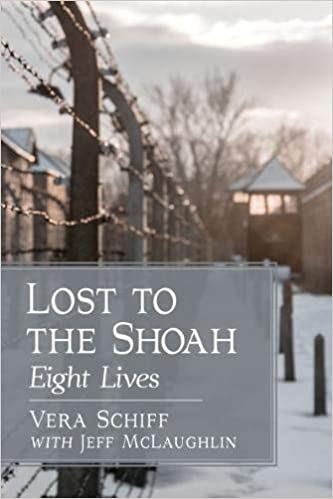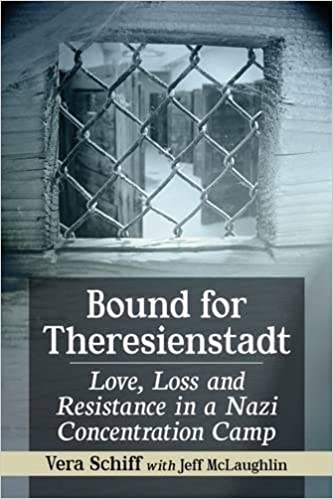 When it comes to Holocaust education, one of the tragic realities is that the millions of lives lost are so often reduced to statistics. The problem with this is it becomes so easy to overlook the fact that each of these numbers represents a human being with a story, a life extinguished by the Nazis.
When it comes to Holocaust education, one of the tragic realities is that the millions of lives lost are so often reduced to statistics. The problem with this is it becomes so easy to overlook the fact that each of these numbers represents a human being with a story, a life extinguished by the Nazis.
This issue is one that Vera Schiff continues to grapple with to this day. And that’s one of the reasons why Vera, an author and Holocaust survivor from Prague, has a mission to share the stories of the people behind the numbers, so that future generations may know them and remember.
Here is Vera’s story.
Vera Schiff’s Early Life
Vera Schiff was born in Prague on May 17, 1926, and grew up in a loving home with her parents Elsie and Siegfried Katz, and her sister Eva, who was 18 months older. Her family was proud of their Jewish heritage and observed the traditions, but also had many Christian friends.
Vera’s father was a lawyer who worked for the Finance Ministry. He provided well for his family, and they lived in a beautiful apartment in the upscale Letna district of Prague. Elsie and Siegfried were loving and nurturing parents who wanted the very best for their daughters. Both Vera and Eva excelled in school, and after school they studied French, piano, and art appreciation with a governess.
Then in March 1939 Vera’s life changed forever. The Nazis had annexed the Sudetenland region of Czechoslovakia in 1938, and they occupied the rest of the country on March 15, 1939. The Nazis then began their systematic persecution of the country’s Jewish population. They soon fired Vera’s father from his job without any pension or severance, and froze his bank accounts. Her family hid many of their valuables, knowing that the Nazis would seize them. The Nazis ordered Jewish families to hand in their jewelry, appliances and other valuables, which were stored in synagogues the Nazis appropriated.
Deportation to Terezin
After living under the brutal Nazi rule in Prague for three years, Vera and her family received a deportation order in May 1942. On a sunny, spring day they bundled up a few belongings and walked to the designated building in central Prague. They sat in a crammed hall with 5,000 other people for three days. During that time, the Nazis took away all their identity cards and papers, and ordered them to hand over the keys to their apartments. Then they boarded a train, which took them to a town called Bohušovice.
The Nazis forced them to exit the train with their belongings and ordered them to march two miles to the gates of Terezin. Vera remembers that the Nazis barked orders at them to move faster during the entire journey. The Nazis stole some of the prisoners’ belongings and herded them into a barrack.
Three days later, Vera and her family were scheduled to be deported again. They were spared due to the intervention of a Gentile friend, Mr. Bleha. He instructed them to talk to his friend Dr. Tarjan, who would help them. Vera slipped through the crowds, found the doctor, and gave him her family’s identity numbers. The doctor told her to go back to her family and lie low.
On the day of the scheduled transport, Vera’s family learned that they were no longer included in it. Instead, Vera, Eva, and their mother were sent to live in the women’s barracks. There, they slept on hard, lice-infested bunks crammed with other women. Vera was assigned to work in the hospital, and Eva was sent to work in the gardens.
In the following video below, Vera discusses her life in Terezin.
In Terezin, rations were extremely meager, and disease was rampant due to the overcrowding, lack of sanitation, and filth of the camp. Vera’s grandmother died shortly after arriving in Terezin, and then her sister Eva became ill.
Desperate to save her, the family tried to get contraband medication and gave her their rations, but Eva died from her illness. Then Vera’s father became ill and died, and her mother’s health also began to fail when she contracted tuberculosis.
Meeting Arthur Schiff
One day when Vera was bringing soup to her mother, she met a young man named Arthur Schiff, a former Czech soldier and Nazi resistor. Despite the squalid conditions of the camp, Arthur looked neat and clean, and he greeted her with a smile.
The two struck up a conversation, and got to know one another as Arthur accompanied her back to her mother. Vera later learned that Arthur belonged to an organized resistance movement composed of former Czech army officials. He participated in many different activities to resist the Nazis, such as forging new identities for Czech Jews and smuggling medications into Terezin.
After they parted, Vera assumed she’d never see him again. After all, this was Terezin, where people died or disappeared every day. But a few days later, Arthur showed up at the hospital where Vera worked, and they soon became inseparable.
In 1944, Arthur asked Vera to marry him. He had heard rumors that if they were married they could be deported together. Vera refused his proposal several times, feeling that her first responsibility was to care for her mother. She hoped she would be able to keep her mother alive until the end of the war and then bring her to a sanatorium. But despite her best efforts, Vera’s mother died from tuberculosis in August 1944, leaving Vera without family.
Later that year, Vera agreed to marry Arthur. They married in the camp on March 6, 1945, and the Chief Rabbi of Denmark officiated the wedding. The couple stood under a chuppah made of sticks and a torn blanket, and since there was no wine, they sipped from a cup of black coffee. Arthur even managed to arrange for a Danish violinist named Hambro to attend and serenade the newlyweds. Even though they were now married, they still had to live apart.
Life After Terezin
The couple survived the war in Terezin, which was liberated by the Russian army on May 8, 1945. Arthur and Vera separated for a time after the war. Vera returned to Prague in the summer of 1945, and lived with her father’s former co-worker. A few weeks later, she was able to reclaim her family’s apartment. But the memories of her lost parents and sister haunted Vera, and she moved to a small room near the university. She also tirelessly worked to find other members of her extended family. Tragically, Vera eventually learned that all her relatives had died in the Holocaust, and she was the only survivor.
Soon after returning to Prague, Vera enrolled in the university, hoping to resume her dream of becoming a doctor. But she struggled with poor health after being in Terezin, which made attending school difficult. Vera later reunited with Arthur, and the couple emigrated to Israel in 1949 with their young son David.
Vera took a job working with newborns in the Rambam hospital, and Arthur started a career as a pharmacist. They later lived in a kibbutz, where their second son Michael was born. Eventually, they moved to a town called Nahariya. Vera has many good memories of their time there. During the years in Nahariya, Vera worked in an outpatient clinic while earning her degree in medical technology.
In 1961, Arthur’s health began to suffer and they moved to Toronto, where his family lived. Both Arthur and Vera continued to work in the medical field until Vera retired in 1991. She then decided it was time to document her memories and experiences in Terezin, and teach younger generations about the horrors of the Holocaust.
She began visiting schools across Canada and wrote five books documenting her experiences. Vera also had a powerful desire to share the stories of people she knew in Terezin. She wanted the world to know the stories of the people behind the numbers, the ones who lived and died in Terezin.
Vera continued this work after Arthur passed away in 2001, and earned an honorary doctorate from the University of New Brunswick, Saint John. Now, 94, Vera continues to live in Toronto and still tirelessly promotes Holocaust education.
Above all, Vera wants people to remember that those who died in the Holocaust are more than victims, that we need to know about their acts of defiance, their courage, and their struggles to maintain their humanity in the face of the some of the most inhumane circumstances the world has ever known.
Further Reading
Bound for Theresienstadt: Love, Loss and Resistance in a Nazi Concentration Camp
Lost to the Shoah: Eight Lives
